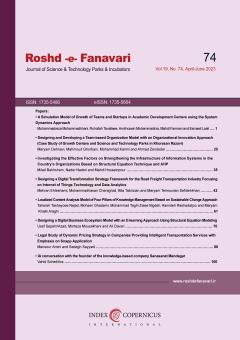Designing and Developing a Team-based Organization Model with an Organizational Innovation Approach (Case Study of Growth Centers and Science and Technology Parks in Khorasan Razavi)
Subject Areas : پارکهاي علم و فناوري و مراکز رشدmaryam dehnavi 1 , Mahmoud , Ghorbani 2 * , Mohammad Karimi 3 , Ahmad zendedel 4
1 - Neyshabur Branch, Islamic Azad University, Neyshabur, Iran
2 - Mashhad Branch, Islamic Azad University, Mashhad, Iran
3 - Neyshabur Branch, Islamic Azad University, Neyshabur, Iran
4 - Neyshabur Branch, Islamic Azad University, Neyshabur, Iran
Keywords: Team-based Organization, Organizational Innovation, Confirmatory Factor.,
Abstract :
Due to the changes that have taken place inside and outside organizations today, the organization needs to be more innovative, flexible and dynamic. Team building, by combining different realities and perspectives to create new capabilities, leads to innovation in organizations. The present study aims to investigate and develop a team-based organization model with an organizational innovation approach. This research is exploratory In terms of purpose. Also, a combination of quantitative and qualitative research method is used. Moreover, data collection tools are questionnaires and interviews. The statistical population was all employees of incubators and science and technology parks in Razavi Khorasan, that 108 employees were selected as a sample based on Cochran's formula. Data analysis was performed by confirmatory factor analysis using Amos software to validate the model. Performing the necessary calculations in the software while confirming the relationships between the latent variables in the structural model indicates that CFI value for the first-order measurement model of innovation and team-based organization Also, the second-order factor analysis model is equal to 0.903, 0.901 and 0.908, respectively. Given that it is more than 0.9, we can say that the data is very well fitted. According to the research findings, it can be conducted that focusing on variables of team-oriented organization can increase the organizational innovation of employees.
1- پرهیزگار، علیاکبر، فروزنده دهکردی، لطفالله، جوکار، علیاکبر، درینی، ولیمحمد، شناسایی عوامل مؤثر بر نوآوري سازمانی با تکیه بر پارادایم نوآوري باز مطالعه موردي: صنعت نشر کشور، فصلنامه علمی پژوهشی مطالعات مدیریت صنعتی - سال یازدهم، شماره31، صفحات 101-125، 1392.
2- محمودی، محمدتقی، افضل کوهی، فروزان، فروزنده، اعظم. بررسي و ارزيابي رابطه بين يادگيري سازماني با نوآوري سازماني كارشناسان دانشگاه اصفهان، نوآوريهاي مديريت آموزشي، سال يازدهم، شماره دوم (مسلسل 42)، 122-104، 1395.
3- غفوریان شاگردی، امیر، بهبودی، امید، فیضپور، مجید. بررسی نقش تعدیلگري خلاقیت و نوآوري سازمانی در رابطه بین رهبري تحولآفرین و عملکرد سازمانی، نشریه صنعت و دانشگاه، سال هشتم، شمارة 29 و 30، صفحه 12-26، 1394.
4- نادی، مجتبی، آهنچیان، محمدرضا، نوغانی دخت بهمنی. مطالعه کیفی وضعیت تیمسازی و کار تیمی در دانشگاههای دولتی ایران، فصلنامه مطالعات رفتار سازمانی، سال ششم، شماره 1 (شماره پیاپی 21)، صص 81-120، 1396.
5- ناصری، بهاره، اکاتی، سهیلا، میرزاده، مراد. بررسی نقش مراکز رشد دانشگاهی در توانمندی کارآفرینانه هستهها و واحدهای فناور مراکز رشد دانشگاه آزاد اسلامی، مجله رشد و فناوری، شماره66، 1400.
6- مهارتی، یعقوب، خوراکیان، علیرضا، فخری فخرآبادی، مسلم. بررسی و تحلیل تأثیر رفتارهای تیمسازی موفق بر نوآوری سازمان درکشده کارکنان (مورد مطالعه: اداره کل راهآهن اصفهان(، مدیریت نوآوری، سال دوم، شماره 3، صفحه 73-98، 1392.
7- صفائی شایگان فرزاد، فرزام فر صبا. بررسی تأثیر نوآوری سازمانی بر قابلیت نوآوری فناورانه و عملکرد شرکتهای تولیدی در شهر صنعتی کرمانشاه با رویکرد مدلسازی ساختاری تفسیری. فصلنامه علمی تخصصی رویکردهای پژوهشی نوین در مدیریت و حسابداری، 1399.
8- میرغفوری، سیدحبیباله، صیادی تورانلو، حسین، کریمینیا، مریم. رتبهبندی عوامل مؤثر بر ارتقای نوآوری در شرکتهای وابسته به مراکز رشد با استفاده از تکنیک تاپسیس فازی؛ مطالعه موردي پارک علم و فناوری یزد، رشد فناوري، فصلنامه تخصصي پارکها و مراکز رشد، سال نهم، شماره 36، 1392.
9- ناصری، بهاره، اکاتی، سهیلا، میرزاده، مراد. بررسی نقش مراکز رشد دانشگاهی در توانمندی کارآفرینانه هستهها و واحدهای فناور مراکز رشد دانشگاه اسلامی، مجله فصلنامه رشد فناوری، سال هفدهم، شماره 66، 1400.
10- طهرانی، مریم، هادیزاده مقدم، اکرم، طبرسا، غلامعلی، حمیدیزاده، محمدرضا. تبیینعوامل سازمانی مؤثر بر عملکرد تیمهای کاری، چشمانداز مدیریت دولتی، شماره 18، صص 47-71، 1393.
11- Chen, J., Yin, X., & Mei, L. Holistic innovation: An emerging innovation paradigm. International Journal of Innovation Studies, 2(1), 1–13, 2018.
12- Egena Odea, Rajenthyran Ayavoo, The mediating role of knowledge application in the relationship between knowledge management practices and firm innovation, Journal of Innovation & Knowledge, Pages 210-218, 2020.
13- Pascale M. Le Blanc & Vicente González-Romá & Haijiang Wang Journal of Business and Psychology, volume 36, pages333–3, 2021.
14- Nemanja Berber, Agneš Slavi´c and Marko Aleksi, Relationship between Perceived Teamwork Effectiveness and Team Performance in Banking Sector of Serbia, Sustainability 2020, 12, 8753; doi:10.3390/su12208753, 2020.
15- Andreas Widmann and Regina H. Mulder, Team learning behaviours and innovative work behaviour in work teams, European Journal of Innovation Management © Emerald Publishing Limited 1641-1141, 2112.
16- Barasaa, L. Knobenb, J.s. Vermeulenb, P. Kimuyua, P. & Kinyanjui, B. Institutions, resources and innovation in East Africa: A firm level approach. Research Policy, 46, 280–291, 2017.
17- Hutton, T. The Development of a Model Factors Promoting Team Effectiveness in the Authomotive Component Industry. Paper presented in partial fulfilment of the requirements for the Master’s Degree in Business Administration in the Faculty of Management at the Port Elizabeth Technikon, 2000.

